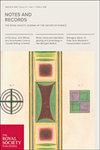携手调查:拿破仑战争期间印度之家的调查与知识资本积累
IF 0.6
3区 哲学
Q3 HISTORY & PHILOSOPHY OF SCIENCE
Notes and Records-The Royal Society Journal of the History of Science
Pub Date : 2018-11-28
DOI:10.1098/RSNR.2018.0039
引用次数: 4
摘要
在19世纪早期,英国科学的物质文化正被日益集中的殖民信息秩序所改变。在拿破仑战争期间和之后进行的调查对东印度公司在伦敦的新藏品的增长尤为重要。随着领土的获得,测量员和他们的工作人员购买、掠夺、收集和以其他方式获得了与艺术、科学、历史、自然历史和文学有关的广泛材料。本文以1795年至1820年间在锡兰、迈索尔和爪哇形成的调查藏品为重点,探讨了该公司的调查和收集文化在公司科学和殖民地收集的政治经济中更广泛的转变中的地位。这些变化包括财产主张的变化,公司在伦敦的图书馆和博物馆的影响力日益增强,最重要的是,拿破仑战争。战时环境不仅提供了获取新材料的基本途径,还提供了廉价的收集模式,以及在商业和领土竞争的驱动下收集或价值收集的动机。本文章由计算机程序翻译,如有差异,请以英文原文为准。
Hand-in-hand with the survey: surveying and the accumulation of knowledge capital at India House during the Napoleonic Wars
In the early nineteenth century, the material culture of British science was being transformed by an increasingly centralized colonial information order. Surveys conducted during and immediately after the Napoleonic Wars were particularly important to the growth of the East India Company's new collections in London. In the wake of territorial gains, surveyors and their staff bought, plundered, collected and otherwise acquired a wide range of materials related to arts, sciences, history, natural history and literature. Focusing on survey collections formed in Ceylon, Mysore and Java between 1795 and 1820, this essay explores the place of the Company's culture of surveying and collecting within both Company science and wider shifts in the political economy of colonial collecting. Such shifts include changes in property claims, the growing clout of the Company's library and museum in London and, most importantly, the Napoleonic Wars. The wartime context enabled not only basic access to new materials but also cheap modes of collection and a motive to collect—or to value collections—driven by commercial and territorial competition.
求助全文
通过发布文献求助,成功后即可免费获取论文全文。
去求助
来源期刊
CiteScore
1.50
自引率
0.00%
发文量
45
审稿时长
>12 weeks
期刊介绍:
Notes and Records is an international journal which publishes original research in the history of science, technology and medicine.
In addition to publishing peer-reviewed research articles in all areas of the history of science, technology and medicine, Notes and Records welcomes other forms of contribution including: research notes elucidating recent archival discoveries (in the collections of the Royal Society and elsewhere); news of research projects and online and other resources of interest to historians; essay reviews, on material relating primarily to the history of the Royal Society; and recollections or autobiographical accounts written by Fellows and others recording important moments in science from the recent past.

 求助内容:
求助内容: 应助结果提醒方式:
应助结果提醒方式:


